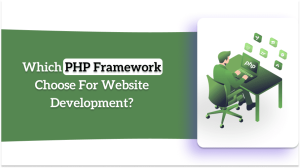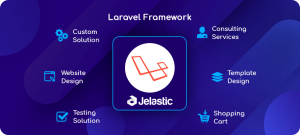A web developer cannot imagine the web images without PHP. It is today’s powerful programming language behind the scenes of most websites and app on the internet. The stage has been set as developers arrive in search of efficiency, maintainability, and versatility in their projects. In these, PHP frameworks became the essential devices. They model a well-defined procedure of creating web applications, which are equipped with libraries, components, and the corresponding architectural structure design to decrease the amount of time developers spend on the implementation.
But, since PHP frameworks supply many of them, you can find it a difficult situation to choose a suitable one for your project. As for every framework – it has its specialty, strengths, and proper place for the use. In this detailed tutorial, there will be an overview on several PHP frameworks and their main possibilities that will help you choose the option of interest most suitable for your project circumstances.

Introduction to PHP Frameworks
PHP frameworks are an aggregate of many libraries, components, and handy tools, that is, a set of ready-made and well-working methods, which facilitate web application development. They are also based on the MVC (Model-View-Controller) architectural pattern or one of its derivatives to provide a single source of truth, code reusability, and ease of maintenance. Via patterns that are provided in frameworks, developers are free from need to create common tasks from scratch and they can focus on writing application-specific code.
Factors to Bear Some Minds When Selecting a PHP Framework
Before diving into the specifics of individual PHP frameworks, it’s essential to consider several factors that can influence your decision:
Project Requirements: Evaluate project performance, manage scalability, materialize security, and eliminate rigidity.
Learning Curve: Weigh the learning curve of each framework and determine the level of convenience to it and understand the PHP and related technology skills of your team.
Community and Support: Study the scale and degree of activity of the community in the ecosystem and check also for resources such as compelling manuals, video tutorials, and strong support services.
Performance: Taking into account the methods of performance tune up offered by frameworks is crucial which is even more so for applications that require good performance and responsiveness.
Ecosystem: Analyze the ecosystem signifying each framework, including available extensions, add-ons and the associated integrations with other software tools and services.
Characteristics: Now, let’s delve into some of the most prominent PHP frameworks and their unique characteristics:
1. Laravel
Laravel has established itself as of the widely used PHP frameworks, with its signature-like design and expression, and its robust functionality bundle. It uses the MVC design pattern and offers diffeerent tools such as routing, authentication, caching and databases management. Laravel’s artisan (CLI) reduces the boring and routine jobs that developers often have to do and, on the other hand, the community and documentation resources help developers to go to the end in any case.
Best Suited For: The Laravel is the best for building APIs, CMS pages, and big applications. Developers of various experience levels find this feature easy to use and inviting because of its simple syntactic structure, and its richness in the ecology.
2. Symfony
Symfony is known as an independent PHP framework with a large community, which provides patterns, components, and features for creating fully-featured systems. It has a great many reusable components such as authentication login, routes, form management and templates. Symfony adopts a de-facto component-based architecture meaning that developers just need a single component aligned for their specific needs and to seamlessly integrate it with other libraries and frameworks.
Best Suited For: Simfony in its basic version is intended for the construction of enterprise-level applications, large-scale projects, and APIs. It comes with the feature-rich structure and flexibility purpose that allows the development of highly comprehensive and customized options.
3. CodeIgniter
CodeIgniter is small in size but big in power PHP framework which has been designed to simplify, speed up and make easy development experience. It has a small layout and minimized design, and, among other things, this is the reason behind its popularity as the fastest solution in the development of applications. PHP coder accepts that the speed and ease of use cannot be compromised for the sake of must-have features and at the same time targeting developers of different skill levels.Best Suited For: CodeIgniter is favorable both for the small projects and for prototyping with the emphasis on speed and simplicity. Moreover, it is a good fit for the applications, where performance and simplicity are the key aspects. It is an awesome option for programmers who need less overhead and are constantly looking for a lighter framework.
4. Yii Framework
The YII (pronounced as “yee”) is an advanced PHP framework that offers high speed, has enhanced security and easy extensibility to customize to the customer-specific needs. DRY principle and it’s also provides with its associated features such as caching, authentication and RESTful API development with the box. The ya II is powered by strong tools code generation and scaffolding, which ensures speedy development, that is why it is liked well by web applications nowadays.
Best Suited For: Yii works well as the framework for developing asynchronous web applications, massive online stores, and multi-user networking sites. Its performance and security improvements make it a preferred app by projects wanting to have beautiful end product.

Conclusion
Selection of a right level PHP framework is a key challenge that might ruin the whole success of your web development projects. Identifying and weighing up the merits of your project requirements, namely, learning curve, community support, and performance, before making a choice of a framework that complements your project and serves to give your development team strength.
Whether you choose Laravel to show elegance, Code igniter for its simplicity, Yii for efficiency, or modularity of Symphony, each PHP framework has a unique set of features that makes it competitive in the market. Eventually, it is the one whose custom aspects the particulars of your task are based on and via which, high-quality, scalable, and maintainable web apps are delivered that is best framework for you.

